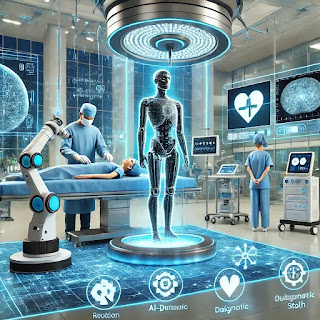How AI is Transforming the Healthcare Industry
Introduction
Artificial Intelligence (AI) is revolutionizing the healthcare industry, bringing faster diagnostics, automated processes, and personalized treatments. From robot-assisted surgeries to AI-powered drug discovery, technology is reshaping the way we approach medical care.
In this blog, we’ll explore how AI is making healthcare more efficient, accurate, and accessible.
1. AI in Medical Diagnostics: Faster and More Accurate Detection
Medical diagnostics has seen a major breakthrough with AI-driven tools capable of analyzing X-rays, MRIs, CT scans, and pathology reports.
✅ IBM Watson Health assists doctors in diagnosing diseases like cancer.
✅ Google’s DeepMind can detect eye diseases with 94% accuracy.
✅ AI algorithms help in early disease detection, reducing misdiagnosis.
🔹 Impact: AI speeds up diagnostic processes, helping doctors make faster and more precise decisions.
2. AI-Powered Virtual Health Assistants & Chatbots
AI-driven virtual assistants are transforming patient interaction and reducing hospital workload.
✅ AI chatbots answer basic health queries and recommend solutions.
✅ Babylon Health & Ada use AI for symptom checking and telemedicine.
✅ AI-powered apps remind patients to take medications and track health metrics.
🔹 Impact: AI assistants improve accessibility to healthcare without long waiting times.
3. AI in Robot-Assisted Surgeries
AI-powered robots assist surgeons in complex minimally invasive procedures, enhancing precision and reducing recovery time.
✅ Da Vinci Surgical System allows robot-assisted surgeries with pinpoint accuracy.
✅ AI-powered robots improve outcomes in neurological, orthopedic, and cardiac surgeries.
✅ Machine learning helps robots adapt to real-time surgical conditions.
🔹 Impact: AI reduces surgical errors and enhances precision in operations.
4. AI in Drug Discovery & Research
AI accelerates drug discovery by analyzing millions of molecular structures in a fraction of the time it takes traditional methods.
✅ BenevolentAI & Atomwise use AI to identify potential drugs faster.
✅ AI played a key role in speeding up COVID-19 vaccine development.
✅ AI helps pharmaceutical companies cut down research costs and time.
🔹 Impact: AI is revolutionizing pharmaceutical research, bringing new medicines to market faster.
5. AI-Driven Personalized Treatment Plans
AI analyzes patient history, genetics, and lifestyle factors to develop customized treatment plans.
✅ IBM Watson for Oncology recommends personalized cancer treatments.
✅ AI helps tailor medications for each patient, reducing side effects.
✅ AI-powered wearable devices monitor health conditions in real-time.
🔹 Impact: AI enables precision medicine, ensuring better treatment outcomes.
6. AI in Predictive Analytics & Early Disease Prevention
AI predicts health risks and outbreaks by analyzing large datasets from medical records and wearable devices.
✅ AI helps detect Alzheimer’s, Parkinson’s, and heart diseases before symptoms appear.
✅ AI-powered wearables (like Apple Watch & Fitbit) track heart rate, sleep, and activity.
✅ AI models predict pandemics and disease outbreaks based on data trends.
🔹 Impact: AI shifts healthcare from reactive to proactive, preventing diseases before they develop.
Challenges & Ethical Concerns
Despite its benefits, AI in healthcare faces several challenges:
❌ Data Privacy Risks: AI systems must follow HIPAA & GDPR regulations to protect patient data.
❌ Bias in AI Models: Training data must be diverse to avoid biased results.
❌ Regulatory Approvals: AI-powered treatments need FDA and WHO approvals.
❌ Job Displacement: AI automation could replace some healthcare roles.
🔹 Solution: Ethical AI development with human oversight ensures fairness, privacy, and accountability.
The Future of AI in Healthcare
The next decade will witness AI-powered hospitals and home healthcare solutions:
🔹 AI-driven robot nurses for patient care.
🔹 Wearable AI devices tracking real-time health conditions.
🔹 AI-powered mental health support via chatbots.
🔹 Blockchain-integrated AI for secure medical records.
🚀 AI is not just assisting doctors—it’s redefining the future of medicine!
👉 What do you think? Will AI-powered doctors and robotic surgeries become the new normal, or will human expertise always be irreplaceable? Let us know in the comments! 🚀

Comments
Post a Comment